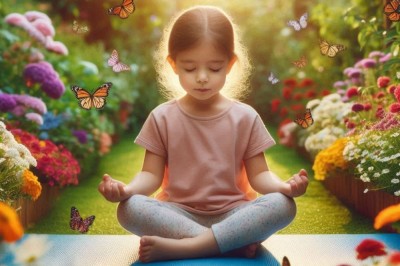Meditation can be a wonderful tool for preschoolers to help them relax, focus, and manage their emotions. The following article provides simple and engaging meditation activities for young children.
-
Breathing Buddies: Have the children lie down with a stuffed animal on their belly. Ask them to watch the stuffed animal rise and fall as they breathe in and out. This helps them focus on their breathing.
-
Magic Wand: Guide the children to imagine they have a magic wand that can make them feel calm and happy. They can wave the wand over different parts of their body, imagining it filling them with a warm, soothing light.
-
Nature Walk: Take the children on a slow, mindful walk outside. Encourage them to notice the sounds, smells, and sights around them. This helps them stay present and appreciate their surroundings.
-
Mindful Colouring: Provide colouring sheets and ask the children to color slowly and mindfully, paying attention to the colors and the motion of their hands.
-
Guided Imagery: Use a guided meditation video designed for kids, like the "Mindfulness Meditation for Kids" or "Guided Meditation for Children". These videos use soothing music and gentle narration to help children relax and visualize peaceful scenes.
Benefits Of Meditation For Preschoolers
- Improved Focus and Attention: Meditation helps young children develop better concentration and attentiveness, which can be particularly useful in a classroom setting.
- Emotional Regulation: It aids in managing emotions, reducing tantrums, and helping children respond more calmly to stressful situations.
- Reduced Anxiety and Stress: Regular meditation can lower anxiety levels and help children feel more relaxed and secure.
- Enhanced Self-Control: Meditation encourages self-discipline and patience, which are important skills for young children to develop.
- Better Sleep: It can improve sleep patterns, helping children fall asleep faster and enjoy more restful sleep.
- Increased Empathy and Kindness: Meditation fosters empathy and respect for others, promoting positive social interactions.
Strategies To Implement Meditation For Preschoolers
1. Keep It Simple and Fun
- Use Simple Language: Explain meditation as a way to help their minds feel calm and happy. You might say, “Meditation is like taking a little break to feel peaceful.”
- Short Sessions: Start with just a few minutes. Preschoolers have short attention spans, so keep it brief and gradually increase the time as they get more comfortable.
2. Incorporate Playfulness
- Meditation Games: Turn meditation into a game. For example, play a “statue game” where they sit still like a statue for a minute.
- Use Props: Use soft toys or stuffed animals. Ask them to place the toy on their belly and watch it rise and fall with their breath.
3. Guided Imagery
- Storytelling: Use guided imagery to take them on a peaceful journey. For example, describe a walk through a magical forest or floating on a cloud.
- Visual Aids: Show pictures or videos of calm scenes, like a quiet beach or a serene garden, to help them visualize a peaceful place.
4. Breathing Exercises
- Belly Breathing: Teach them to breathe deeply by placing their hands on their belly and feeling it rise and fall.
- Blowing Bubbles: Have them blow bubbles slowly and watch them float away, which helps them focus on their breath.
5. Consistency and Routine
- Regular Practice: Incorporate meditation into their daily routine, such as before nap time or after playtime.
- Create a Calm Space: Designate a quiet, comfortable spot for meditation where they feel safe and relaxed.
6. Use Music and Sounds
- Calming Music: Play soft, soothing music or nature sounds during meditation to create a relaxing atmosphere.
- Guided Meditations: Use child-friendly guided meditation recordings that are specifically designed for young children.
7. Model the Behavior
- Practice Together: Meditate with them to show that it’s a shared activity. Children often learn by imitating adults.
- Be Patient: Understand that it might take time for them to get used to the practice. Celebrate small successes and keep the experience positive.
8. Mindful Activities
- Mindful Eating: Practice eating a snack slowly, paying attention to the taste, texture, and smell.
- Nature Walks: Take them on a walk and encourage them to notice the sights, sounds, and smells around them.
By making meditation a fun and engaging part of their day, you can help preschoolers develop a lifelong habit of mindfulness and emotional well-being.
References:
- Meditation for Kids: The Basics and the Benefits, Health Essentials
- Meditation For Kids: Benefits, Basics, And Expert Tips, Begin Learning
- Meditation for children: 8 reasons to start right now, Mindful Little Minds







 As an Educator in Australia, your pay rate falls under the Children’s Services Award 2010. This award states the minimum amount that an employer can
As an Educator in Australia, your pay rate falls under the Children’s Services Award 2010. This award states the minimum amount that an employer can When working as a qualified Early Childhood Teacher (with a university degree) within a service, your rate of pay will come from the Educational Services
When working as a qualified Early Childhood Teacher (with a university degree) within a service, your rate of pay will come from the Educational Services When working as a Diploma Qualified Educator your pay rate is from the Children's Services Award 2010. This Award states your minimum rate of pay
When working as a Diploma Qualified Educator your pay rate is from the Children's Services Award 2010. This Award states your minimum rate of pay When working as a Cert 3 Qualified Educator, your pay rate is from the Children's Services Award 2010. This Award states your minimum rate of
When working as a Cert 3 Qualified Educator, your pay rate is from the Children's Services Award 2010. This Award states your minimum rate of Educational Leaders play a crucial role in their early childhood service by ensuring that the educational program aligns with best practices and supports the holistic
Educational Leaders play a crucial role in their early childhood service by ensuring that the educational program aligns with best practices and supports the holistic In early childhood education and care, ratios are more than a technicality—they are a frontline safeguard. Every child deserves responsive supervision, emotional connection, and developmental
In early childhood education and care, ratios are more than a technicality—they are a frontline safeguard. Every child deserves responsive supervision, emotional connection, and developmental With the new national child safety reforms kicking in on 1 September 2025, early childhood services like yours have a real opportunity to lead the
With the new national child safety reforms kicking in on 1 September 2025, early childhood services like yours have a real opportunity to lead the Here’s a comprehensive Mobile Phone and Smart Watch Policy tailored for early childhood education and care (ECEC) services in Australia, aligned with the latest 2025
Here’s a comprehensive Mobile Phone and Smart Watch Policy tailored for early childhood education and care (ECEC) services in Australia, aligned with the latest 2025 The Sea of Fish Challenge is a national initiative that invites children, educators, families, and communities to create and display fish artworks as a symbol
The Sea of Fish Challenge is a national initiative that invites children, educators, families, and communities to create and display fish artworks as a symbol Across the early childhood education and care sector, educators are sounding the alarm: current staffing ratios are insufficient to deliver safe, meaningful, and developmentally appropriate
Across the early childhood education and care sector, educators are sounding the alarm: current staffing ratios are insufficient to deliver safe, meaningful, and developmentally appropriate


